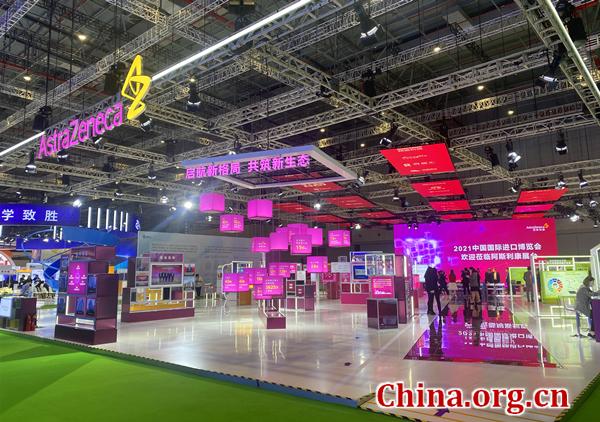?AstraZeneca expands its talent nurturing plan in China
- By Zhang Rui
 0 Comment(s)
0 Comment(s) Print
Print E-mail China.org.cn, November 6, 2021
E-mail China.org.cn, November 6, 2021
A top human resources executive of global medicine giant AstraZeneca revealed to China.org.cn that they are expanding their program to train more versatile talent in China.

This year marks the fourth consecutive year of AstraZeneca's participation at the China International Import Expo (CIIE). During the 4th CIIE held from Nov. 5-10, the corporation is focusing on a strategy of employment value proposition, which "will help our firm strengthen high-quality talent development," said Jenny Leo, vice president of AstraZeneca China and head of its human resources department.
On Friday, the first day of this year's CIIE, AstraZeneca signed three cooperation agreements concerning two major projects — school-enterprise cooperation and talent exchange.
The first cooperation project is with Nanjing University's School of Life Sciences. AstraZeneca will build a positive talent workstation through a series of interactive measures to realize the depth of cooperation and foster youth talent.
"We have planned such cooperation projects with several universities in different cities and are in discussions with them. Nanjing University is very open and has the essential need to sign the deal, so we chose them as the first partner," Leo explained. She added that she hoped they could do such deals with a total of five universities by the end of this year.
Such AstraZeneca workstations in key universities will integrate the commercialization of scientific research results, the development of students' professional abilities, corporate visits, the recruitment of interns and graduates, and scholarships. In addition, Leo said the company has committed to building up talent reserves for the reform and transformation of the medical industry. They hoped to cultivate versatile talent with local insights, international visions, and crossover capabilities, developing future leaders for the Chinese medical and health industry.
AstraZeneca also signed deals to collaborate with Chic Health and Huijiu Learning to fulfill its long-term talent strategy and enhance bilateral staff exchanges with "PLAN100." The plan is part of AstraZeneca's talent training plan that has persisted for many years, which they will upgrade to a talent development ecosystem. This plan aims to break down the barriers between enterprises and exchange talent, including sending staff to assist collaborating companies in foreign territories. However, due to the COVID-19 pandemic, some international exchange plans are now virtual.
Next, as Leo revealed, AstraZeneca plans to work with the government, welcoming government staff to join the enterprise and learn about their operations.

AstraZeneca, headquartered in Cambridge, the United Kingdom, is solidifying its presence in the Chinese market, which has grown into the company's second-largest market in the world. At its 1,100-square-meter CIIE booth, they exhibited several impressive achievements. Since entering the Chinese market in 1993, AstraZeneca has introduced nearly 40 global high-quality, innovative medicines, as well as advanced technology and production equipment. They have helped the Chinese medical system address respiratory diseases, the cardiovascular system, metabolism, digestion, and kidney health. It has invested more than $1 billion in China, with total R&D investment standing at $1.5 billion and import value reaching $20 billion.
"As a multinational company deeply rooted in China, AstraZeneca will continue to play our role as a bridge. We will bring not only good products and technologies into China but also bring Chinese innovative products and solutions to the world," said Leon Wang, executive vice president of AstraZeneca. He added they have been deeply impressed by the significant impact and spillover effects of the CIIE and achieved fruitful results each time for four consecutive years.





